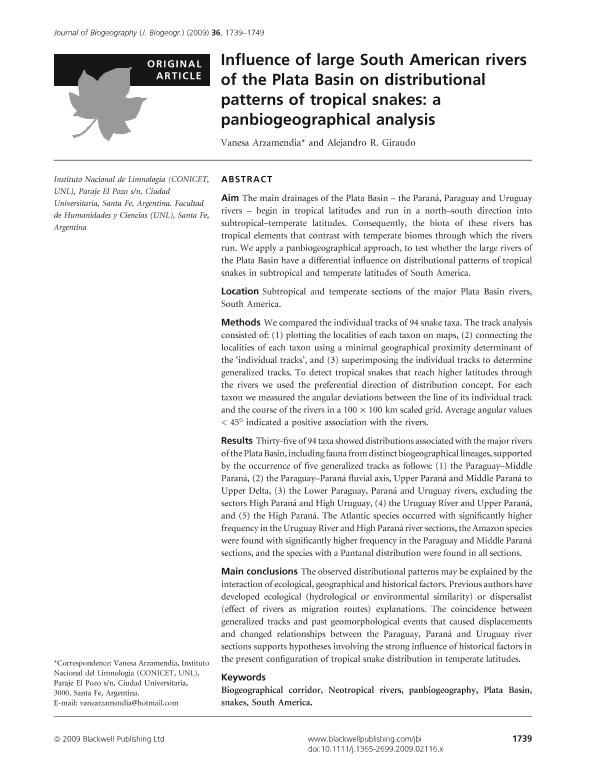Mostrar el registro sencillo del ítem
dc.contributor.author
Arzamendia, Vanesa

dc.contributor.author
Giraudo, Alejandro Raul

dc.date.available
2020-04-22T22:17:19Z
dc.date.issued
2009-09
dc.identifier.citation
Arzamendia, Vanesa; Giraudo, Alejandro Raul; Influence of large South American rivers of the Plata Basin on distributional patterns of tropical snakes: a panbiogeographical analysis; Wiley Blackwell Publishing, Inc; Journal of Biogeography; 36; 9; 9-2009; 1739-1749
dc.identifier.issn
0305-0270
dc.identifier.uri
http://hdl.handle.net/11336/103388
dc.description.abstract
Aim: The main drainages of the Plata Basin ? the Parana´ , Paraguay and Uruguay rivers ? begin in tropical latitudes and run in a north?south direction into subtropical?temperate latitudes. Consequently, the biota of these rivers has tropical elements that contrast with temperate biomes through which the rivers run. We apply a panbiogeographical approach, to test whether the large rivers of the Plata Basin have a differential influence on distributional patterns of tropical snakes in subtropical and temperate latitudes of South America. Location: Subtropical and temperate sections of the major Plata Basin rivers, South America. Methods: We compared the individual tracks of 94 snake taxa. The track analysis consisted of: (1) plotting the localities of each taxon on maps, (2) connecting the localities of each taxon using a minimal geographical proximity determinant of the ?individual tracks?, and (3) superimposing the individual tracks to determine generalized tracks. To detect tropical snakes that reach higher latitudes through the rivers we used the preferential direction of distribution concept. For each taxon we measured the angular deviations between the line of its individual track and the course of the rivers in a 100 · 100 km scaled grid. Average angular values < 45 indicated a positive association with the rivers. Results: Thirty-five of 94 taxa showed distributions associated with the major rivers of the Plata Basin, including fauna from distinct biogeographical lineages, supported by the occurrence of five generalized tracks as follows: (1) the Paraguay?Middle Parana´, (2) the Paraguay?Parana´ fluvial axis, Upper Parana´ and Middle Parana´ to Upper Delta, (3) the Lower Paraguay, Parana´ and Uruguay rivers, excluding the sectors High Parana´ and High Uruguay, (4) the Uruguay River and Upper Parana´, and (5) the High Parana´ . The Atlantic species occurred with significantly higher frequency in the Uruguay River and High Parana´ river sections, the Amazon species were found with significantly higher frequency in the Paraguay and Middle Parana´ sections, and the species with a Pantanal distribution were found in all sections. Main: conclusions The observed distributional patterns may be explained by the interaction of ecological, geographical and historical factors. Previous authors have developed ecological (hydrological or environmental similarity) or dispersalist (effect of rivers as migration routes) explanations. The coincidence between generalized tracks and past geomorphological events that caused displacements and changed relationships between the Paraguay, Parana´ and Uruguay river sections supports hypotheses involving the strong influence of historical factors in the present configuration of tropical snake distribution in temperate latitudes.
dc.format
application/pdf
dc.language.iso
eng
dc.publisher
Wiley Blackwell Publishing, Inc

dc.rights
info:eu-repo/semantics/openAccess
dc.rights.uri
https://creativecommons.org/licenses/by-nc-sa/2.5/ar/
dc.subject
BIOGEOGRAPHICAL CORRIDOR
dc.subject
NEOTROPICAL RIVERS
dc.subject
PANBIOGEOGRAPHY
dc.subject
PLATA BASIN
dc.subject
SNAKES
dc.subject
SOUTH AMERICA
dc.subject.classification
Zoología, Ornitología, Entomología, Etología

dc.subject.classification
Ciencias Biológicas

dc.subject.classification
CIENCIAS NATURALES Y EXACTAS

dc.title
Influence of large South American rivers of the Plata Basin on distributional patterns of tropical snakes: a panbiogeographical analysis
dc.type
info:eu-repo/semantics/article
dc.type
info:ar-repo/semantics/artículo
dc.type
info:eu-repo/semantics/publishedVersion
dc.date.updated
2020-04-21T15:25:13Z
dc.journal.volume
36
dc.journal.number
9
dc.journal.pagination
1739-1749
dc.journal.pais
Reino Unido

dc.journal.ciudad
Londres
dc.description.fil
Fil: Arzamendia, Vanesa. Consejo Nacional de Investigaciones Científicas y Técnicas. Centro Científico Tecnológico Conicet - Santa Fe. Instituto Nacional de Limnología. Universidad Nacional del Litoral. Instituto Nacional de Limnología; Argentina
dc.description.fil
Fil: Giraudo, Alejandro Raul. Consejo Nacional de Investigaciones Científicas y Técnicas. Centro Científico Tecnológico Conicet - Santa Fe. Instituto Nacional de Limnología. Universidad Nacional del Litoral. Instituto Nacional de Limnología; Argentina
dc.journal.title
Journal of Biogeography

dc.relation.alternativeid
info:eu-repo/semantics/altIdentifier/doi/http://dx.doi.org/10.1111/j.1365-2699.2009.02116.x
Archivos asociados
